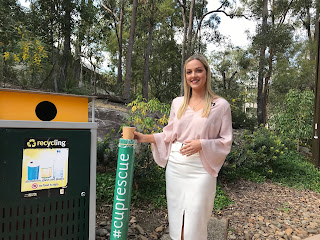There is a lot of
misunderstanding when it comes to recycling and many consumers assume that recyclable coffee cups Sydney can be really recycled. In fact, it is not that simple because most
coffee cups are made with a lined layer of polyethylene which makes the cup
waterproof therefore making it difficult for the cup to be effectively recycled
because it can’t be easily separated. There are few recycling facilities that
can process this kind of cup. Even though some coffee chains say that they have
largely recyclable coffee cups Sydney, the evidence presented was that most cups were
not sent for recycling. Giant coffee retailers launched a scheme giving
customers a 10-15 percent discount for bringing their own cup to promote
environment friendly move. But reusable cups made of silicone and rubber have
not really caught on, probably because they need washing up. Cups are not
reusable in the same way as plastic bags, and if this means we are stuck with
paper-plastic hybrids, retailers should contribute to the cost of getting rid
of them in an environmentally responsible way, either through higher taxes or
by helping local authorities design workable cup recycling schemes. The
commercial reality is that these companies will have to instantly produce billions
of compostable cups, no doubt duplicating and increasing the environmental
impact of the industry’s cup mountain and costing coffee companies and thereby
the coffee drinker, a lot of money.
Some recyclable coffee cups
claim to be recyclable, some claim to be compostable and others are sold as
biodegradable, but these claims can be misleading for such reasons:
Recyclable
Whether a plastic-coated
paper cup is recyclable varies from area to area, with some local waste
management accepting coffee cups as part of their recycling process, while
others exclude them and dump them in landfill.
Compostable
When the materials of these
cups break down, they are supposed to be suitable for using in compost. However,
composting is not widely available in some countries, so cups are put in
household or community compost. Most compostable coffee cups still end up in
landfill.
Biodegradable
This fact explains by using
an additive in the oil-based plastic lining which will break down when deprived
of oxygen. However, this has not sufficiently proven that this does in fact
work.
Coffee cups can possible be recycled
properly and it simply requires a different approach. Existing paper recycling
facilities can be adapted to process coffee cups or new technologies can be
used. There are organizations in the process of introducing dedicated
collection and recycling programs for coffee cups. The real key is to change
your ways. If we can understand the implications of the waste involved with
disposable food and drink, then we can really make a difference for the
betterment of the future. There are numerous resources out there that can help
you understand recycling and how the environment should be cared for and
preserved. If people can learn to take simple actions now to protect the
environment, then the companies responsible for unsustainable packaging will
possibly change their ways too.
